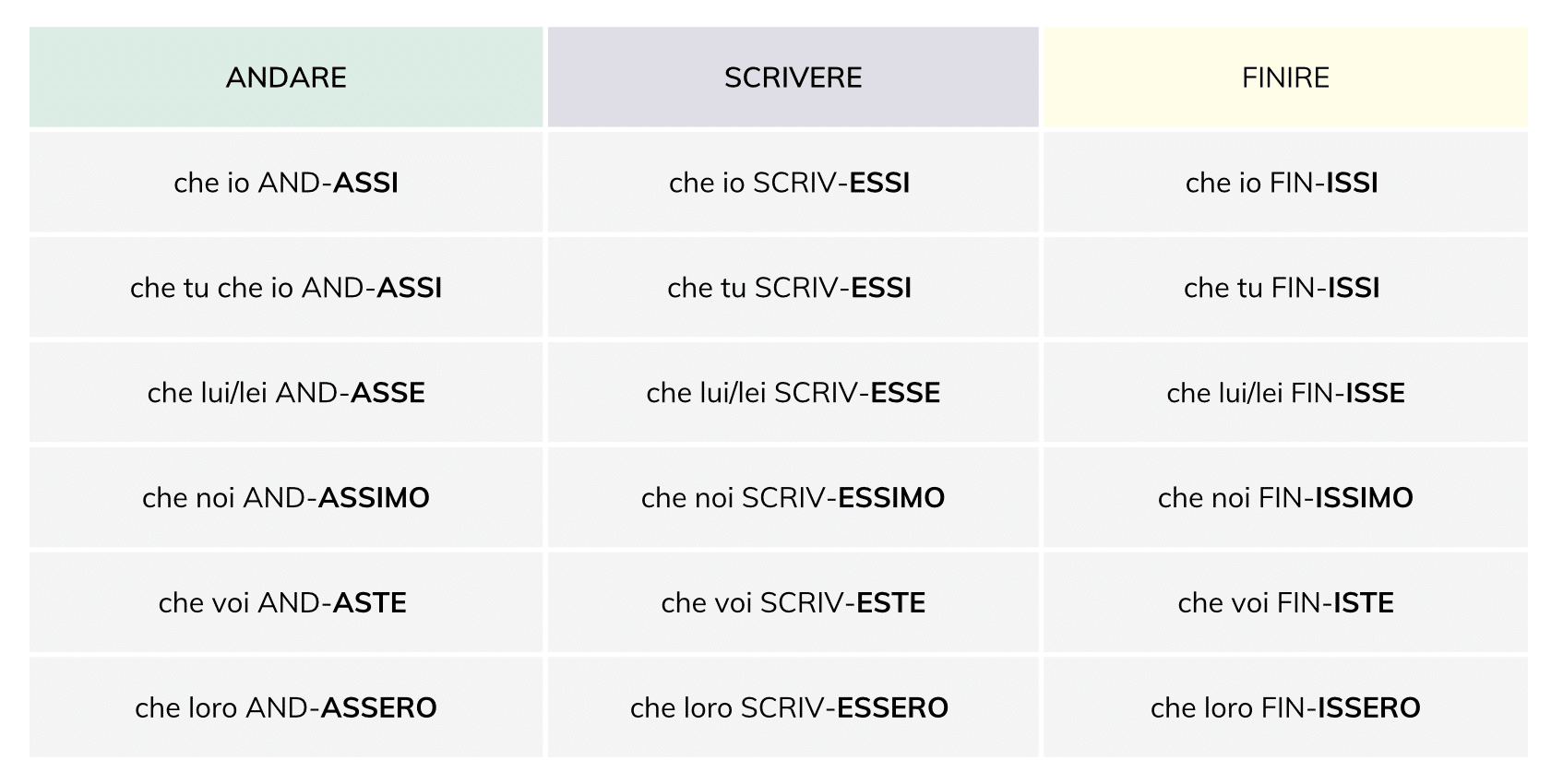This article is suitable for intermediate and advanced learners.
What Is the Subjunctive (Congiuntivo)?
The subjunctive (congiuntivo) is a common mood in Italian used to express hope, wishes, opinions, or someone else’s point of view regarding an action.
The Italian subjunctive has four tenses.
- present subjunctive (congiuntivo presente)
- past subjunctive (congiuntivo passato)
- imperfect subjunctive (congiuntivo imperfetto)
- pluperfect subjunctive (congiuntivo trapassato)
In this post, we will delve into the use of the imperfetto congiuntivo (imperfect subjunctive), which, along with the present subjunctive, is the second most commonly used subjunctive tense.
How to Conjugate the Imperfect Subjunctive
The Imperfect Subjunctive is generally formed with very regular verbs, having only three irregular stems (fac-essi, bev-essi, dic-essi), and, of course, the verb “essere”, which turns into “fossi”. Apart from these minor irregularities, you can easily conjugate the imperfect congiuntivo by following the conjugation chart.

Irregular forms
essere: che io fossi, che tu fossi, che lui/lei fosse, che noi fossimo, che voi foste, che loro fossero
fare: che io facessi, che tu facessi, che lui facesse, che noi facessimo, che voi faceste, che loro facessero
bere: che io bevessi, che tu bevessi, che lui/lei bevesse, che noi bevessimo, che voi beveste, che loro bevessero
dire: che io dicessi, che tu dicessi, che lui/lei dicesse, che noi dicessimo, che voi diceste, che loro dicessero.

Test Your Italian
Not sure what your Italian level is? I’ve created a free online Italian test to help you determine it.How to Use the Imperfect Subjunctive (Imperfetto Congiuntivo)
There are at least four common uses of the imperfect subjunctive. Let’s explore them one by one.
The imperfect subjunctive after a main clause
The imperfect subjunctive is commonly used after a main clause containing a verb of opinion, wish, hope, or emotion when the main clause is conjugated in the past tense.
Examples:
- Credevo che non fossi sposato (I believed that you were not married)
- Volevi che mi chiamassi (You wanted me to call you)
- Speravamo che venisse a trovarci (We hoped that he/she would come to visit us)
The imperfect subjunctive in the if clause
The imperfect subjunctive s frequently used to express a possibility through an if clause (the ‘periodo ipotetico di 2° tipo‘). The imperfect subjunctive is used immediately after the ‘if’ (si).
Examples:
- Se avessi più tempo, studierei di più (If I had more time, I would study more.)
- Se vivessimo in Italia, mangerei cibo più sano (If we lived in Italy, we would eat healthier food)
- Se potessi, verrei (If I could, I would come)
The imperfect subjunctive after vorrei
In Italian, when you use “vorrei” (which means “I’d like to”), and you want to express a desire, you typically follow it with the imperfect subjunctive. However, if the desire is about the same person, you use an infinitive verb instead of the imperfect subjunctive.
Examples:
- Vorrei che tu venissi (I’d like you to come), desire about someone else
- Vorrei che facesse più caldo (I’d like if it were wormer), desire about something
BUT…
- Vorrei venire (I’d like to come to the party), desire about oneself
The imperfect subjunctive after magari
In Italian, the word “magari,” when followed by an imperfect subjunctive verb, is used to express a wish or desire. For example:
- Magari avessi qualche anno in meno (I wish I were a few years younger)
- Magari vivessi in Italia (I wish I lived in Italy)
- Magari fosse qui con noi (I wish he/she were here with us)
So, “magari” is a way to express wishes or desires, often accompanied by the imperfect subjunctive (congiuntivo imperfetto) to indicate the hypothetical or unreal nature of the wish.








